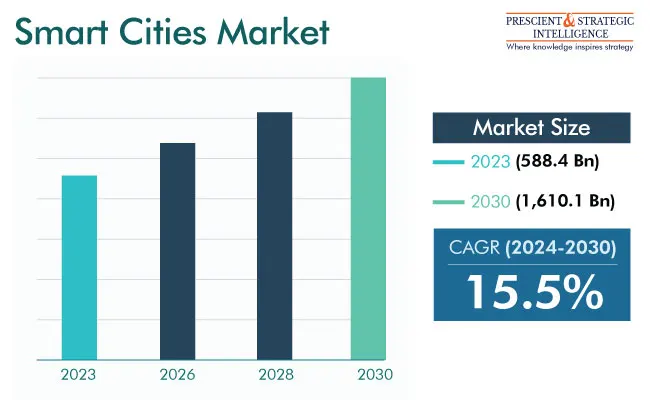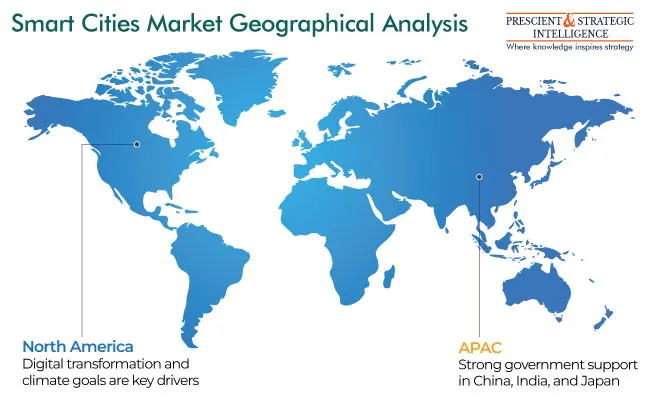Report Code: 10945 | Available Format: PDF
Smart Cities Market Size and Share Report - Global Trends, Development and Demand Forecasts, 2024-2030
- Report Code: 10945
- Available Format: PDF
- Report Description
- Table of Contents
- Request Free Sample
Smart Cities Market Size & Share
The smart cities market is valued at USD 588.4 Billion (E) in 2023, and it will reach USD 1,610.1 Billion by 2030, advancing at 15.5% compound annual growth rate between 2024 and 2030.
This is attributed to the developments in technology, rising urbanization, public safety & security, and the growing concerns regarding sustainability.
For instance, as of May 2023, the India smart cities mission comprises approximately 7,800 projects valued at INR 1.8 lakh crores. Of these, more than 5,700 projects (73%) worth INR 1.1 lakh crores (60%) have been completed. Additionally, INR 38,400 crore has been disbursed for the India smart cities mission until May 2023, with INR 35,261 crore already utilized.

Drivers
- Developments in technology: The use of technologies such as IoT, AI, 5G, and big data allow the collection as well as analysis of large amounts of data, which consequently support the decision-making and optimization of city operations.
- Increasing urbanization: The increasing urbanization is a major reason behind the current demand for smart city solutions that enable effective resource management, improved infrastructure, and a better quality of life.
- According to the UN, 68 percent of the global population will live in urban areas in 2050.
- Public safety & security: Smart city technologies such as video surveillance, data-driven crime prediction, and intelligent traffic systems are being implemented to improve public safety as well as security.
- For example, the global demand for video surveillance will reach USD 114.9 billion in 2030.
- Rising sustainability worries: Cities are becoming more determined to reduce their environmental footprint and promote sustainable practices with the objective to develop and achieve a smart use of energy, waste management, and green mobility.
- For instance, cities, home to over ½ of the global population and are accountable for approximately 70% of global greenhouse gas emissions.
- Moreover, Copenhagen aims to be the 1st carbon neutral capital by 2025. In the next decade, Copenhagen's population is likely to increase by 20 percent, and the capital wants to demonstrate the possibility of combining development, growth, and enhanced quality of life with the decrease of carbon dioxide emissions.
Trend
- Data-driven decision-making: Cities are using data acquired from various sensors and other sources to better understand traffic patterns, energy consumption, and citizen behavior. This in turn informs decision-making on resource allocation as well as service delivery.
- For instance, the demand for intelligent traffic cameras will reach USD 24,465.6 million in 2030.
- Emphasis on specific areas: Although smart cities comprise several areas, certain areas including smart energy (renewable energy integration), smart healthcare (e.g., telemedicine/digital health), and smart mobility (such as autonomous vehicles) are witnessing rapid developments.
- The global digital health industry will reach a value of USD 783,848.2 million in 2030.
- Citizen engagement & inclusivity: The role of inclusive design and community engagement in smart city development is gaining more importance to provide equitable access to benefits and to avoid digital divides.
Challenge
Smart cities development faces many challenges. The high initial investment is a major challenge that requires significant resources for the deployment of strong infrastructure, a trained workforce, and cutting-edge technology. Besides, guaranteeing data privacy and security is of significant importance, involving all-inclusive approaches to protect citizens' data from unauthorized usage and exploitation of information.
- In September 2022, the San Francisco 49ers, an American football team, acknowledged that a ransomware attack during Super Bowl week compromised their systems and may have exposed the personal data of 20,930 people.
- Moreover, in 2023, the average cost of a data breach globally was USD 4.45 million, which is an increase of 15 percent over 3 years.
Furthermore, the absence of interoperability is also a key challenge, requiring smooth integration between various systems to ensure efficient data transfer and collaborative nature. Moreover, it is important to create a supportive environment for acceptance and trust among the public, thus requiring greater awareness about the benefits and potential risks of smart city technologies in order to ensure their integration in urban settings.
Hardware Is Largest Contributor
The hardware category, based on components, is the largest contributor to the industry. Smart cities rely heavily on hardware components, which must be extremely reliable to enable seamless operation. Smart city systems generally require the integration of various hardware components from different vendors, and their compatibility and interoperability are of great importance.
- For instance, the global demand for smart meters will reach USD 20.0 billion by 2030.
With the increasing growth and development of smart cities, their infrastructure should be scalable to fit the new devices, applications, or sensors. The right hardware components, for instance, scalable and easy to expand or upgrade are a must for such scalability.
| Report Attribute | Details |
Market Size in 2023 |
USD 588.4 Billion (E) |
Revenue Forecast in 2030 |
USD 1,610.1 Billion |
Growth Rate |
15.5% CAGR |
Historical Years |
2017-2023 |
Forecast Years |
2024-2030 |
Report Scope |
Market Trends, Drivers, and Restraints; Revenue Estimation and Forecast; Segmentation Analysis; Impact of COVID-19; Companies’ Strategic Developments; Market Share Analysis of Key Players; Company Profiling |
Explore more about this report - Request free sample
Smart Utility Accounts Largest Share
The smart utility category, on the basis of application, accounts for the largest share of the industry. Smart utility is a critical component of a city's infrastructure. The emergence of smart grids is also one of the major contributing factors in the adoption of smart utilities. The incorporation of modern data analytics and cloud solutions is also likely to boost the industry’s expansion. Presently, the demand for energy is growing at a high rate; hence, businesses and governments are developing and implementing strategies that will increase the renewable sources' contribution to total energy creation.
North America Is Dominating Industry
North America is the largest contributor to the industry. This is because of the continuous digital transformation across different sectors, including telecom, banking, government, and more. The continent has a highly developed ICT infrastructure, the existence of major technology providers, and the collaboration of local and federal governments with I.C.T. providers. These service providers as well as other local authorities have extensively deployed parts of the public connectivity infrastructure which will result in the planning for creating smart cities in this continent. These factors will also support the regional industry expansion in the coming years.
Furthermore, the increasing government funding in the U.S. to facilitate the country’s transition towards a digital economy has brought in a positive outlook for smart cities in the nation. The U.S. government is concentrating on digitizing commercial buildings to improve citizens’ experiences and promote service transparency. Therefore, boosting the industry growth in the nation.
- According to a report, the U.S. city governments will invest around USD 41 trillion over the next 20 years to enhance their infrastructure to benefit from the Internet of Things. With the large investments, the IoT will change the quality of life for people in cities.
APAC is likely to observe the fastest CAGR during this decade. The shift of the government towards digital infrastructure and digital transformation is the major driver for this growth. Moreover, the booming population, robust economic growth, and increasing globalization are likely to drive the growth of the regional industry in the coming years. Furthermore, the increasing government spending to renovate different sectors including transportation, energy, and public security will further assist the industry expansion.
- According to UNICEF, cities in the APAC region are growing at a rapid pace, and around 55% of the population in this region is likely to live in urban areas in 2030.

Competitive Landscape
The smart cities market is highly competitive, with a variety of large and small companies, all competing on aspects such as innovation, product offerings, pricing, services, and technology. Strategies such as partnerships, collaboration, mergers, and acquisitions are often used to expand industry presence and strengthen positions.
- In February 2023: Oracle declared plans to establish a 3rd public cloud region in the Kingdom of Saudi Arabia. This will help in meeting the continuously surging need for cloud service.
- In February 2023: Google and Uber declared an extended partnership in which Uber has chosen Google to assist in the transformation of its data cloud infrastructure and reform the consumer experience for Uber drivers, merchants, and users.
Major Players in the Industry
- Cisco Systems Inc.
- IBM Corporation
- Microsoft Corporation
- Oracle Corporation
- General Electric Company
- Google, Inc.
- ABB Ltd
- Schneider Electric SE
- AGT Bus- & Eventlogistik GmbH.
- Itron Inc.
- Honeywell International Inc.
- Huawei Investment & Holding Co. Ltd.
Want a report tailored exactly to your business strategy?
Request CustomizationWant an insight-rich discussion with the report author?
Speak to AnalystOur dedication to providing the most-accurate market information has earned us verification by Dun & Bradstreet (D&B). We strive for quality checking of the highest level to enable data-driven decision making for you
Our insights into the minutest levels of the markets, including the latest trends and competitive landscape, give you all the answers you need to take your business to new heights
With 24/7 research support, we ensure that the wheels of your business never stop turning. Don’t let time stand in your way. Get all your queries answered with a simple phone call or email, as and when required
We take a cautious approach to protecting your personal and confidential information. Trust is the strongest bond that connects us and our clients, and trust we build by complying with all international and domestic data protection and privacy laws